
|
|


The Québec 2010 organizing committee has decided to organize an ecologically responsible XIII International Winter Road Congress to do its part for the environment, in keeping with the theme of the congress, "Sustainable Winter Service for Road Users".
On the advice of the Québec City Convention Centre’s eco-advisor, three objectives have been set :
- reduce greenhouse gas emissions
- reduce waste
- use regional businesses
Various steps have been taken in preparing the congress to reduce its ecological footprint :
Congress promotion and sales
Donation to an organization involved in sustainable development projects
Conferences
Technical visits
Exhibition
Special events
Meals
Accompanying person's program
Transportation
Accommodations
Congress delegate kit
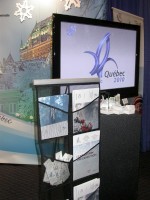
Promotion involves travels and the production of documentation, two major sources of GHG emissions. A rationalization effort was made to reduce these emissions:
- Travel to reach as many parteners as possible around the world was significantly reduced thanks to the existence of two exhibition marketing offices (one in Europe and one in Québec);
- For travel in North America, car use, rather than aircraft use, was encouraged as far as possible;
- Only two bulletins were published instead of three, as was the tradition for previous winter road congresses. The paper used to produce these two bulletins was composed of 100 % post-consumer fibre;
- In order to reduce the use of paper, the Québec 2010 Office had regularly appeal to electronic media (Web site, online registration, e-newsletters, etc.).
In order to offset the environmental footprint of the Congress, the Québec 2010 Organizing Committee has decided to go a step further by giving a donation of $7,200 to the Fondation de la faune du Québec (FFQ). The FFQ is an organization that gives financial support to projects involving the conservation and development of Québec's natural environment.
This financial contribution will be used for a project that entails planting windbreaks in the agricultural community of the Chaudière-Appalaches region, on the province of Québec. These windbreaks have several benefits. In fact, they help to improve road safety, not only by controlling drifting snow and the build-up of snow on the road, but also by guiding animals through migration corridors, which are very useful particularly in relocating certain breeding areas of white-tailed deer, thereby reducing collisions between cars and deer.
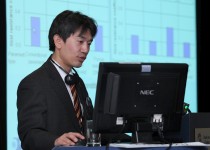
Modern technology makes it possible to significantly reduce the consumption of paper at conferences. Accordingly, all means currently available have been used to achieve the "zero paper" objective.
- All signage to guide congress delegates inside the Québec City Convention Centre has been established using monitors.
- All communications from speakers have been presented exclusively in electronic format.
- All congress delegates' and exhibitors' name tags have been collected at the end of the congress.
- The water offered to congress delegates at the Convention Centre has been distributed using pitchers, and the cups used will be recyclable.

The technical visits allowed for the demonstration of Quebecers' know-how regarding sustainable winter service for users. Note that three of the seven visits proposed were selected for their particular approach to sustainable development :
- The City of Québec snow-melting facility (V4);
- The visit to the management of Lévis waste snow (V5);
- The Québec-Lévis ferry crossing (V6).
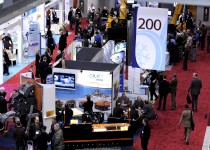
International exhibitions generate much waste and significant GHG emissions through the transportation of participants and numerous items. This type of event presents many opportunities to reduce GHG emissions. That is why, beyond the efforts of the congress organizing committee, it seemed vital that exhibitors be given tools and tips to help them do their part for the environment.
- The exhibitor's handbook was available only in electronic format on the official congress website.
- Selective waste receptacles were available in the exhibition area and offered at all turnkey stands.
- The congress promoter offered ecologically responsible turnkey stands.
- To help exhibitors design an ecologically responsible stand, a self-evaluation of their efforts has been offered to them.
- A "green brigade" helped exhibitors use, as often as possible, the waste sorting and collection systems available when they take down their stands.
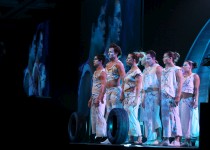
- Artistic activities were presented by Québec artists.
- A limited number of copies of the Congress journal were distributed.
It is always difficult to accurately estimate the number of guests actually present. That’s why it was important that congress delegates respond as accurately as possible to the question regarding their presence at the banquet to avoid waste. Other actions have been taken to minimize losses :
- Thanks to a table service, food surpluses were distributed to a charity organization in the Québec area;
- The Convention Centre composted any food waste;
- The tableware used was porcelain (non-disposable dishes);
- The Convention Centre gave priority to food products from the Québec region.
Accompanying persons got the opportunity to visit a certified organic farm on île d'Orléans.
It is widely known that transportation is the main cause of GHG emissions. The congress organizing committee has established ways of reducing these emissions on-site. Congress delegates were also responsible for choosing ecologically responsible transportation to get to the congress :
- Congress delegates' travels were reduced due to the proximity of the hotels to the Convention Centre. Public transport was encouraged. A shuttle service to and from the various site of the Congress was offered to participants;
- In order to mitigate the negative effects of GHGs caused by air transportation, congress delegates received information regarding ways of offsetting the GHG emissions generated by their travels by checking the services offered by their air carrier or by contributing to a fund to finance sustainable development programs.
For the reservation of hotel blocks for participants, the Congress Organizing Committee chose hotels that have demonstrated a true desire to protect the environment by the implementation of a green action plan.
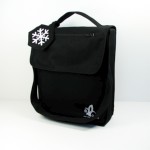
- The various items in the congress delegate kit were carefully selected to make sure not only that they were manufactured in Canada, but also that the materials used were as environmentally friendly as possible.
- The kit's contents were limited to the bare minimum to avoid waste.
Congress participants could also contribute to making this event ecologically responsible by :
- Using the recycling stands for plastic, glass, metal, paper and cardboard and the bins for compostable materials (food waste, napkins, etc.);
- Dropping their name tags in the collection bin reserved for this purpose at the end of the congress;
- Using public transit – train, bus, green bus (free), carpooling – to get to the Convention Centre.
Through all these actions, the Québec 2010 Office is proud to have made this event a model of ecological responsibility.
|
To facilitate reading of the text, the masculine is used without any discriminatory intent. |